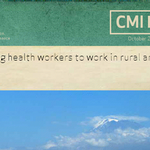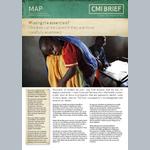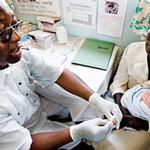Poor motivation compromises health care
One out of 12 Tanzanian children dies before their fifth birthday. Many of them die from diseases like pneumonia and diarrhea, conditions that are initially not life-threatening. Health workers are supposed to follow WHO guidelines that are designed to make it easier to identify the causes of a child’s illness. However, a recent study from rural Morogoro and Dodoma in Tanzania shows that many health workers ignore these guidelines. Only 53 % of the doctors ask the caretaker whether the child has fever. For all other signs and symptoms, the probability that the doctor will ask or check is less than 50 %. Some of the procedures in the WHO guidelines are hardly ever performed.
As a consequence of inadequate examinations,Tanzanian patients systematically receive health services below required levels. This could represent a serious threat to patients’ lives. Through the MAP-project, a cooperation between CMI, the University of Bergen, NIMR (National Institute for Medical research), REPOA (Research on Poverty Alleviation) and Bergen University College, researchers have mapped different aspects of health worker motivation in Tanzania.
The motivation of health workers is thought to be strongly connected to the quality of service. It is a rather discouraging fact that many of the health workers admit that work ethic generally is low. However, there is a huge potential for better quality of health services within the existing work force. The researchers administered a series of knowledge tests. The health workers’ answers to the test show that their level of knowledge by far exceeds their actual performance.
The MAP-project demonstrates how important motivation is for the quality of health services. Some of the clinicians that are part of the study implied that low salaries are the reason for low motivation. However, better payment is not guaranteed to improve motivation and hence the quality of health services. Rather, the researchers suggest building a stronger professional ethic amongst health workers.
The results from the study are published in a series of CMI Briefs and will be presented in a conference at NIMR in Dar-Es-Salaam this week.
Publications

Convincing health workers to work in rural areas

Is worker effort higher in church-based than in government health facilities?

Huge potential for improved health service quality

Missing the essentials? Children can be saved if they are more carefully examined
Ottar Mæstad
Projects

Global Health and Development

